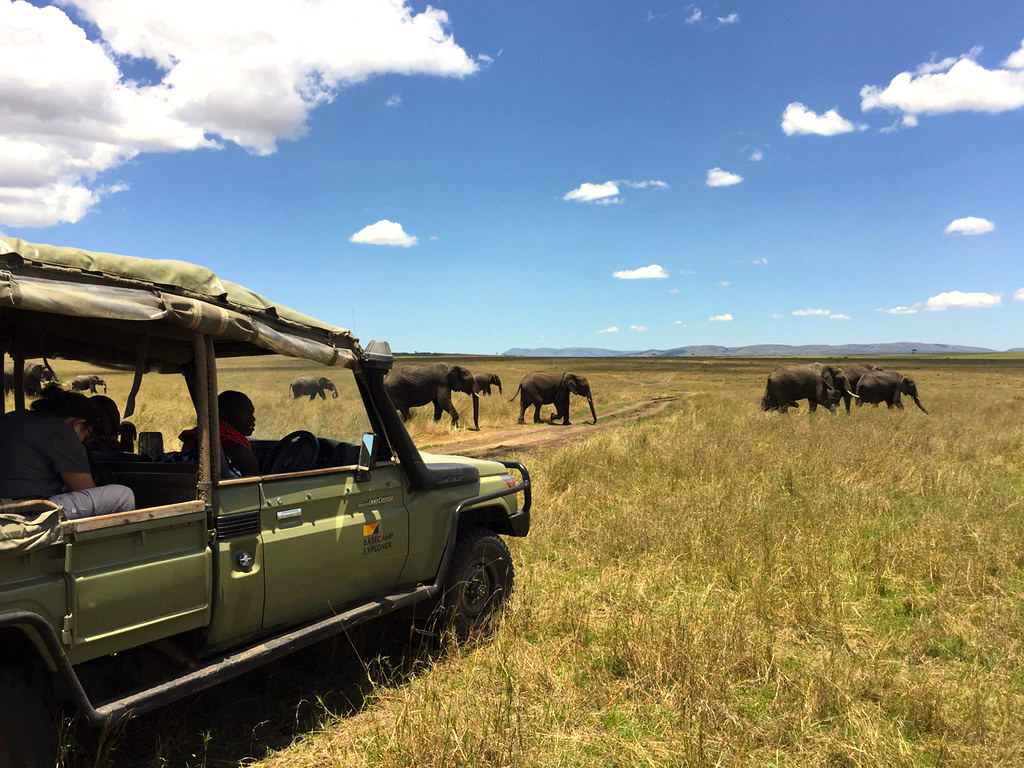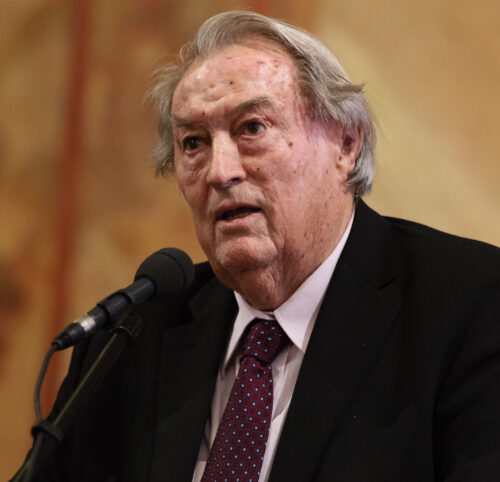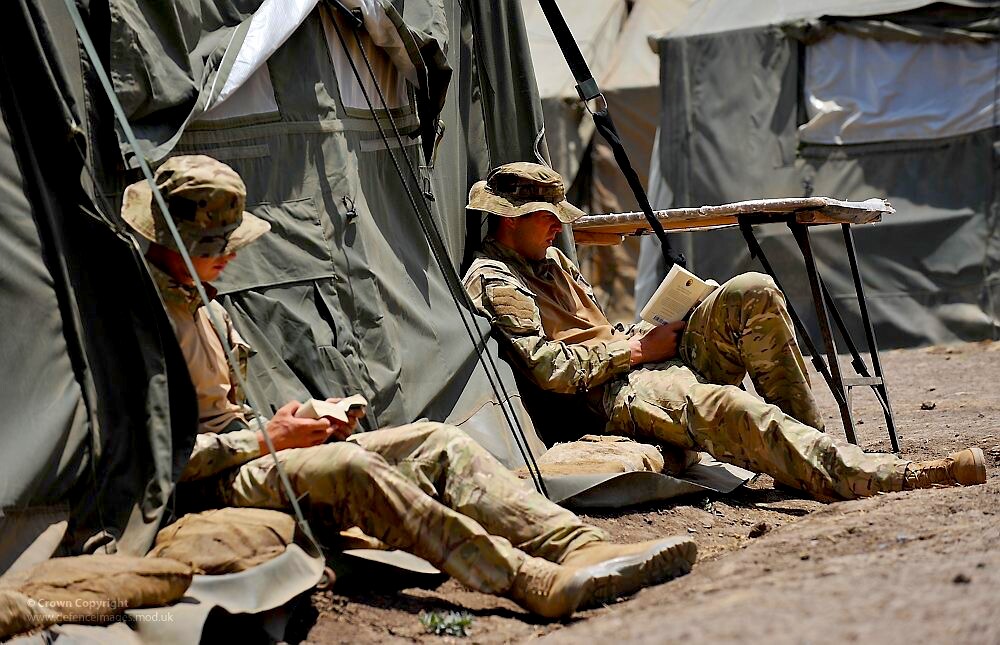A British soldier who handled a notorious IRA informer also gave spy tips to east African wildlife rangers whose shoot-to-kill anti-poaching policy killed dozens of innocent Kenyans, Phil Miller reports.

On safari in Masai Mara, Kenya, 2018. (Animal People Forum, Flickr, CC BY-NC 2.0)
By Phil Miller
Declassified UK
 The Kenya Wildlife Service, which operates a shoot-to-kill policy against ivory hunters, was advised by a senior British military intelligence officer intimately involved in the conflict in Northern Ireland.
The Kenya Wildlife Service, which operates a shoot-to-kill policy against ivory hunters, was advised by a senior British military intelligence officer intimately involved in the conflict in Northern Ireland.
Colonel Colin Parr visited Kenya between tours during the “Troubles” when he allegedly handled “Stakeknife” – the British army’s most senior spy inside the IRA’s Internal Security Unit, known as the “nutting squad.”
Police are probing the spy’s activities amid concerns the British agent was allowed to kidnap, torture and even murder other suspected spies to keep his cover.
In 1985, the queen awarded Parr an OBE for his “distinguished service in Northern Ireland.” And by the early 1990s, he was head of army intelligence in the province.
African ‘Adventure’
It can now be revealed that while rising through the ranks, Parr went on a reconnaissance trip in April 1990 to the Masai Mara, a large national game reserve in Narok, Kenya.
There he inspected Kenyan efforts to save elephants and rhinos. Parr’s visit came after Kenya Wildlife Service (KWS) director, Richard Leakey, lobbied hard for U.K. military support.
Tourism then contributed nearly £200 million to Kenya’s economy. Most visitors went on safari, making wildlife protection “critical” for the country.
Leakey wanted KWS to have an “effective, but small intelligence unit from which our operations can be planned.” Leaky died earlier this month aged 77, after having built KWS into an armed, paramilitary force. Its rangers are accused of disappearing and killing dozens of innocent Kenyans wrongly suspected of poaching. Some of the poachers came from the large Somali community whose land falls inside Kenya.
Informers

Richard Leakey in 2014. (Pierre-Selim, CC BY 2.0, Wikimedia Commons)
A report found by Declassified at the U.K. National Archives said Parr encouraged Leakey’s squad to recruit more informers against poachers and to protect them from reprisals.
“There is a pressing need for operations which are mounted as a result of informant information (and there are many) to be conducted in a manner which does not prejudice the security of the source,” Parr advised KWS.
“Recently two informants were shot dead as a result of an insecure link between their information and a consequent operation.”
Parr suggested recruiting informers from “villages where bandits have attacked or intimidated and where there may be resentment.”
Parr also suggested the Kenyans receive night vision surveillance gear, training at a spy school in Kent and a six month visit from another army intelligence officer. He advised: “Detection/arrest/kill ratios only have a prospect of major improvement if they can be based on pre-emptive intelligence.”
War Crimes
Reacting to our finding that Parr visited Kenya, Belfast-based solicitor Kevin Winters told Declassified:
“It should come as no surprise that a very high ranking member of the military intelligence services may have been ‘rewarded’ in this way for their work during the conflict.”
His firm, KRW Law, represents families affected by the Stakeknife mission, which Winters said entailed “the oversight of agents and informants who were involved in killing U.K. citizens, some of whom may in turn have been informants or agents themselves.
“In any normal democracy people who were at the helm of this type of ‘intelligence policing’ might have been indicted for war crimes.”
Support CN’s Winter Fund Drive!
Winters commented that Parr’s Kenya trip “chimes with Britain’s colonial past and if nothing else confirms the systemic exchange of military strategic thinking and resources between the former colonies. The North of Ireland in many ways was treated as a colonial outpost when it came to counter terrorism strategy.”
National Asset

U.K. soldiers in downtime during training in Kenya, 2012. (Defence Imagery, Kellie Williams)
Kenya became independent from Britain in 1963 but U.K. soldiers continue to train in the former colony.
In 1990, such exercises were conducted “totally free of charge.” Some officials feared U.K. troops would lose this concession if they did not back Leakey’s conservation drive.
A British brigadier wrote that assisting KWS would be seen as “in return for the provision of training areas” and “will enhance our position with President Moi,” then Kenya’s authoritarian leader who ruled until 2002.
One colonel warned in a telegram: “An inadequate response will put an important national asset (our training rights) at risk.”
But a colleague disagreed, writing by hand on the telegram that this argument was “crap.”
A Ministry of Defence official noted: “We continue to believe that support of the KWS is not directly in the defence interest.” Ultimately the MOD opted to support Kenyan conservation efforts. More recently, the parachute regiment trained KWS rangers.
Anti-poaching is now a normal activity for the U.K. military. A British soldier was crushed to death by an elephant while on patrol in Malawi in 2019.
‘Idiot’
Leakey led KWS from its inception in 1990 to 1994 and returned as chairman in 2015. He told journalists from Vice News to “piss off” when questioned about allegations that dozens of people had been disappeared by KWS rangers.
Asked by Vice, “Is there a human price to pay for animal conservation?,” Leakey told their reporter before stopping the interview: “Of course there is – idiot. You are an idiot.”
An MOD spokesperson told Declassified:
“The British Peace Support Team (Africa) provides training to the Kenyan Defence Force and other African partners in peace support operations.
On rare occasions, individuals from the Kenyan Wildlife Service have been allocated places on these training courses. Our training and engagement activities help make communities in Africa safer.
For reasons of operational security, we do not comment on intelligence roles.”
KWS did not respond to requests for comment.
Phil Miller is Declassified UK’s chief reporter. Follow him on Twitter at @pmillerinfo
This article is from Declassified UK.
Support CN’s
Winter Fund Drive!
Donate securely with PayPal
Or securely by credit card or check by clicking the red button:


Proof, once again, that the cover provided by the words “intelligence”, “secrecy” “national security” gives free access to treasury funds to pay, bribe, influence criminal enforcers:
JUDGE JURY EXECUTIONERS
That’s who we are and have been and always will be – more so now with preprogrammed machines that will make the “decisions”.
Woe are we.
That’s also why Julian Assange is in prison because he believes deeply that democracy will only be achieved when a majority of people have access to the truth about crimes done in our name. That’s why the U.S. Govt and their sidekicks the British Govt are punishing him.
It’s a stain on the British Govt and hierarchy including the Crown and the Queen too. It’s a stain on our “Justice Dept” and our President and our members of Congress.
Bottom line is that we lie to ourselves about who we are. And the journalist publisher with the most courage and integrity and effectiveness in exposing crimes that we pay for is now in the jaws of the criminals.
That’s who we are.
This article doesn’t do justice to the memory of Richard Leakey, a very prominent conservationist and paleontologist, who accomplished much good in his life.
Also, having retired military intelligence officers help in anti-poaching campaigns is an excellent use of their skills.
Of course it’s regretable that innocent lives have reportedly been lost in Kenya’s anti-poaching effort, and all measures need to be take to prevent this in the future. However, a very tough policy against poaching is essential to preserve the remaining large mammals in Africa from extinction. Kenya’s shoot-to-kill anti-poaching policy has proven to be very effective in reducing poaching activity – and certainly gets the attention of the poachers.
‘This article seems to reflect “specieism” – the final form of prejudice and discrimination that needs to be tackled – which regretably is quite anchored in Western “civilization” – the Cartesian idea that only humans are rational and worthy of life, and all other living creatures can be exterminated without a second thought.
I agree with your critique of speciesism. Not sure how the author feels about that one way or the other.
There’s something more than speciesism going on with poaching – the for profit murder and exploitation of animals.
There’s a role played by the people who traffic in this crime – just like sex traffickers who traffic in our own species – and the role played by people who are the “end users”.
The murder of (endangered) animals for profit compounded by the murder of innocent people thought to be murdering the animals because of BAD intelligence and the trafficking of human children for sex show the darkest side of human beings